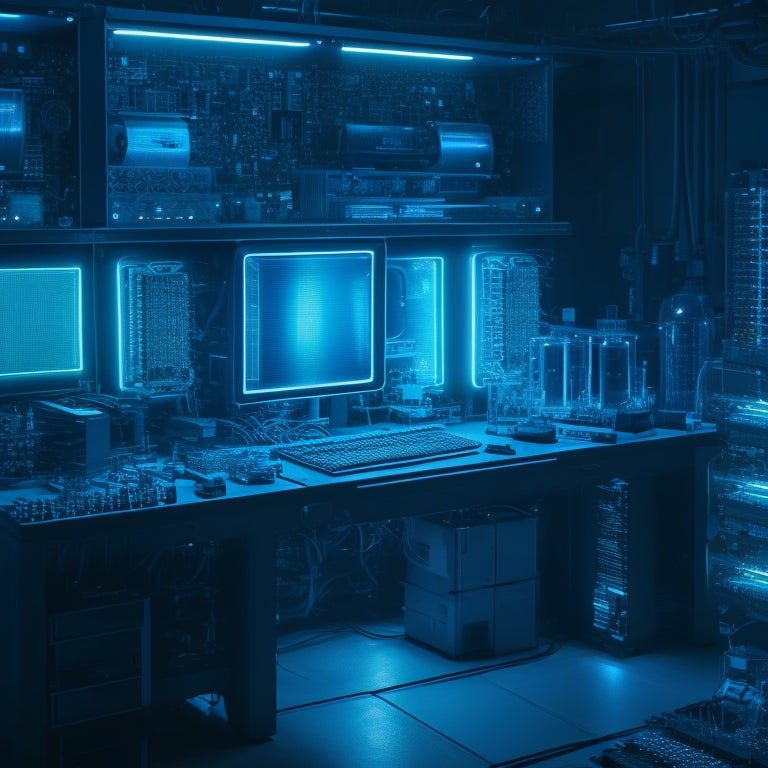
Unveiling the World of Computer Hardware Components
Share
Computer hardware components form the backbone of modern computing, encompassing a vast array of intricate systems and devices that work in harmony to process, store, and communicate information. At the core of computer processing hardware are 64-bit systems, often featuring a Graphics Processing Unit (GPU) that offloads computationally intensive tasks from the Central Processing Unit (CPU). Effective GPU utilization improves system responsiveness. Primary storage options include Hard Disk Drives (HDD) and Solid-State Drives (SSD), each offering distinct advantages regarding data access, latency, and reliability. As we explore these fundamental components, a deeper understanding of the intricate relationships between them awaits.
Key Takeaways
• Computer processing hardware includes laptops, workstations, and servers, typically featuring 64-bit architecture and a Graphics Processing Unit (GPU) for efficient processing.
• Primary storage options are Hard Disk Drives (HDD) and Solid-State Drives (SSD), each with its unique benefits and trade-offs in terms of capacity, speed, and cost.
• The Central Processing Unit (CPU) executes instructions and performs calculations, while Random Access Memory (RAM) provides temporary storage for data and applications.
• Effective utilization of the GPU and other hardware components can significantly improve system responsiveness and overall performance.
• Familiarizing oneself with basic hardware components, such as motherboard, power supply, and storage devices, is essential for building, upgrading, or troubleshooting a computer system.
Computer Processing Hardware Explained
At the heart of every computer system lies the computer processing hardware, comprising laptops, workstations, and servers, which are typically 64-bit and often feature a Graphics Processing Unit (GPU) to handle complex computations and graphics-intensive tasks.
The GPU plays an important role in enhancing system performance by offloading computationally intensive tasks from the Central Processing Unit (CPU), thereby optimizing overall system efficiency. Effective GPU utilization can greatly improve system responsiveness, making it an essential consideration for users requiring high-performance computing.
Moreover, overclocking benefits can be achieved by pushing the GPU to operate at higher clock speeds, resulting in improved performance and increased productivity. However, it is crucial to practice safe overclocking practices to prevent damage to the system components.
Storage Options and Technologies
In addition to the computer processing hardware, a complete computing system requires effective storage solutions to efficiently manage and retrieve data, which is where storage options and technologies come into play.
The primary storage options are Hard Disk Drives (HDD) and Solid-State Drives (SSD). SSDs offer faster data access, lower latency, and higher reliability compared to HDDs, making them a popular choice. However, HDDs provide higher storage capacity at a lower cost per gigabyte.
Cooling solutions, such as heat sinks and fans, are essential to prevent overheating and guarantee reliable operation. When selecting a storage solution, it is essential to take into account factors such as data security, power consumption, and durability to ensure the overall safety and efficiency of the computing system.
Understanding Key Hardware Components
The Central Processing Unit (CPU) and Random Access Memory (RAM) are two fundamental hardware components that form the backbone of a computer system, working in tandem to execute instructions and store data temporarily.
Understanding these hardware basics is essential for peak system performance. The CPU, also known as the brain of the computer, executes instructions and performs calculations, while RAM provides temporary storage for data and applications.
Other essential components include the motherboard, power supply, and storage devices. Each component has a specific function, and their collective integration enables a computer system to operate efficiently.
Familiarizing oneself with hardware basics and component functions is necessary for building, upgrading, or troubleshooting a computer system safely and effectively.
Frequently Asked Questions
Can a Computer Run Without a Cooling System?
While possible, running a computer without a cooling system is not advisable, as it can lead to overheating, damaging components, and reducing system lifespan; heat management is essential for silent operation and overall system safety.
What Is the Purpose of On-Board Storage on a Motherboard?
On-board storage on a motherboard enables fast data transfer and access to essential system files, utilizing flash memory to provide a reliable and secure storage solution for firmware, drivers, and operating system components.
Are There Any Computers That Use Only Optical Storage?
Like a beacon in the dark, optical storage shines bright, but its limitations prevail. While some computers rely solely on optical drives, such as gaming consoles, most systems require a hybrid approach to balance storage needs and data accessibility.
Can a GPU Be Used as a CPU in Certain Situations?
In specific scenarios, a GPU can be leveraged as a CPU surrogate, harnessing GPU acceleration and parallel processing capabilities to tackle compute-intensive tasks, but this is not a conventional replacement for a dedicated CPU.
Do All Computers Have an Add-On NIC for Internet Connectivity?
"Not all computers require an add-on NIC for internet connectivity, as many modern systems integrate wireless routers and network architecture, allowing for seamless connectivity without additional hardware, ensuring reliable and secure online access."
Related Posts
-

Mastering the Art of Darkroom Photography
You're about to enter a precise, hands-on world where you'll enhance your photographic vision into museum-quality pri...
-

Revolutionize Your Kitchen With Sink Upgrades
Revamp your kitchen by enhancing your sink with thoughtfully chosen accessories, transforming it into a multitasking ...

